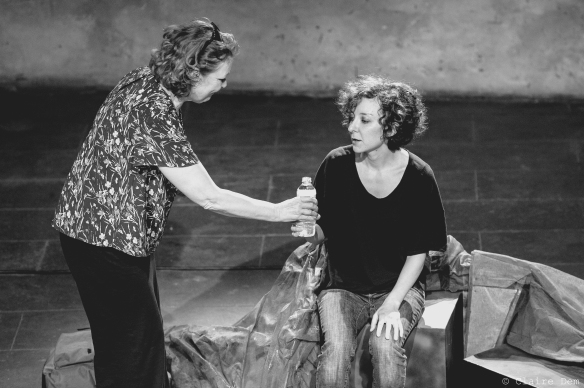
L to R: Juliette Togashi (Nora), Mia Leahy (Marlene) and Tonya Trappe (Eleni) in “The Crossing” at Théâtre de l’Opprimé in Paris through 4 Feb. Photo: Claire Demoute
Bonjour Solidarity began just over a year ago, an attempt to tell stories that might help make 2016 a little bit brighter than 2015 had been. With the help of our artist and activist friends, we were able to do that for a few months, coming together for a June event that raised nearly 3,500 euros for l’Auberge des Migrants. Soon afterwards I found myself overwhelmed by the series of cataclysmic events that 2016 put forth – stunned into a silence brought on by sadness, incomprehension and paralysis.
A Wednesday night performance gave me my words again. I was fortunate to be in the audience for the opening night of “The Crossing,” the English-language adaptation of the French play La mer qu’on voit danser by Dominique Chryssoulis, lyrically translated by Jenny Gilbert and Tonya Trappe, which runs through Sunday February 5 at Théâtre de l’Opprimé in Paris’ 12th arrondissement.
The evening opened with actors reading short essays by Daniel Pennac, Jessie Magana and Carole Saturno, published together in a booklet entitled “Eux c’est nous” (“They Are Us”), benefitting La Cimade, a non-profit organization assisting refugees, migrants and asylum seekers.
The texts read like an uncomfortable reminder: the world has never seen this many human beings displaced by war and persecution (currently estimated by the United Nations High Commission for Refugees at more than 65 million). The number of refugees in Europe almost doubled from 2014, which saw 240,000 people arrive in the first six months of the year, compared to 2015, when the number reached 430,000 for the same period. More than 3,000 men, women and children lost their lives while attempting to cross the Mediterranean in 2015; many more are believed to have done the same in 2016.
It is in this context that “The Crossing” begins. The action takes place on the Greek island of Lesbos, one of the front lines of the European refugee crisis, given its proximity to Turkey. Three women meet on a beach: Eleni, the wife of a local fisherman who has lost his livelihood and probably his soul after months of confronting the waves of daily human misery; Marlene, a tourist just looking for a peaceful place to relax without having to confront “reality,” and Nora, a young woman from a “war-torn country” who survived the previous night’s crossing, after being separated from her younger brother Sami, whose photo she clutches to her chest: “5’11”, dark hair, green eyes, jeans, trainers, navy blue T shirt.”
Sami will be attempting the crossing that night.

Tourist Marlene (Mia Leahy) offers water to refugee Nora (Juliette Togachi). Photo: Claire Demoute
While Eleni assures Nora that the sea is calm, the night is clear, the moon is bright, the audience is left to sit with its own inquietude…shouldn’t we all be doing more than just watching, waiting and hoping that everything turns out all right?
1-5 February at the Théâtre de l’Opprimé, 78 rue du Charolais 75o12 Paris. reservation@theatredelopprime.com /01.43.40.44.44
-CB
Can you help us with the occasional blog translation from English into French, Arabic or any other language? Please leave a comment here or write us at bonjoursolidarity@gmail.com

Une mise en lumière et en mots brillante de cette tragédie grecque, européenne … mondiale que l’actualité passe à nouveau sous silence.
Trois comédiennes, pleine de charisme, incarne trois femmes, trois destins se croisant sur l’ile de Lesbos : Marlène, l’insouciante européenne venue passer des vacances légères dans un décor paradisiaque, Eléni, femme de pêcheur qui a vu partir ce qu’elle aimait et Nora, migrante ballotée par la guerre, la faim, la peur, attend la traversée de son frère. Trois mondes qui s’ignorent, ne se comprennent pas, vont nous faire vivre leur rencontre, déchirante d’humanité.
Qui est la victime de ce drame ? Et nous, que faisons nous ?
LikeLiked by 1 person
Merci pour les pensées!
LikeLike